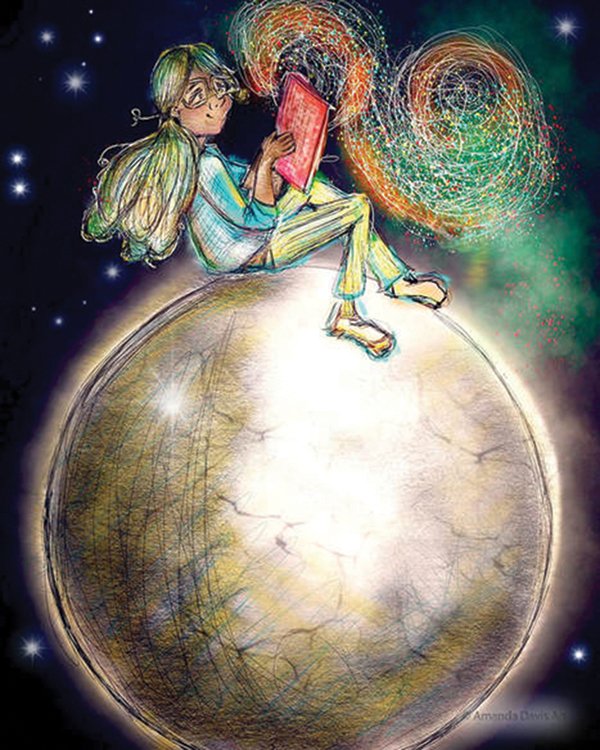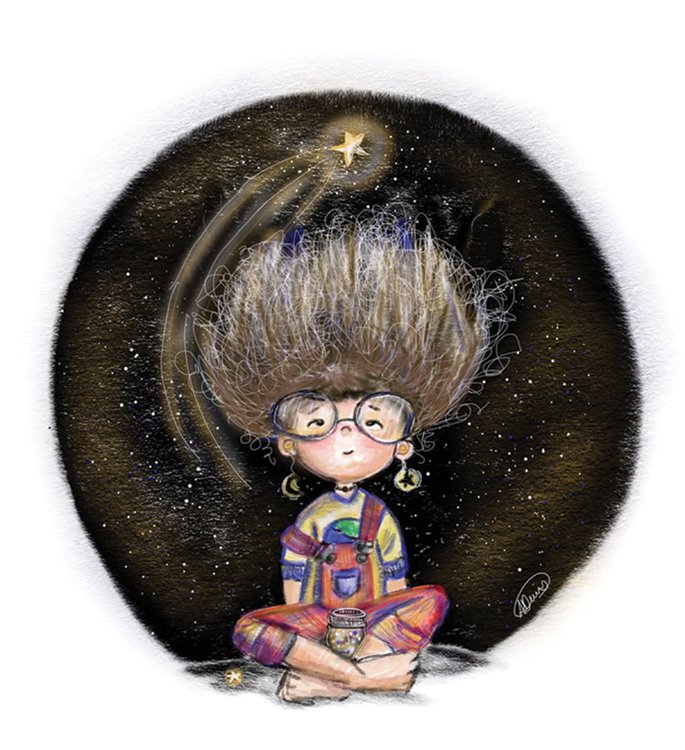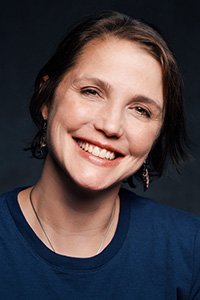School’s Out Forever
The day I first heard Frank Blood’s name had been hot and humid. Summer of 1972. West Virginia. I was eight years old, you eighteen. The trees filled out, bulging, all silver-green and weeping sap. All the windows in the house open, the curtains fluttering weakly. The sun sloped westward, casting long shadows.
By Carol Willis
The day I first heard Frank Blood’s name had been hot and humid. Summer of 1972. West Virginia. I was eight years old, you eighteen. The trees filled out, bulging, all silver-green and weeping sap. All the windows in the house open, the curtains fluttering weakly. The sun sloped westward, casting long shadows.
Home from the swimming pool, I lay slopped on the couch, watching television. Mom had just come home from work. Andy was outside under the carport, tinkering with his Ford Mustang. Dad wasn’t home yet.
You were sick, behind the bathroom door, throwing up, heaving. Scary and unearthly sounds came from deep inside you. You cried out for mom, a rusty sound. Your voice high-pitched and frightened and for an instant, I imagined you a little girl.
A thump on the tiled bathroom floor when you collapsed. A scurry of activity, mom running, a blade of light flashing in the dim hallway as the bathroom door opened and slammed shut.
Then mom’s strident voice from behind the door, Georgia, go get Andy.
Andy’s footsteps galloping down the hallway, another streak of light glinting like before. I strained to hear far distant noises, muffled cries, then mom yelling, Rosalyn! Your name sounding more like a question and I wonder briefly where you have gone.
I watch, survey the scene in the frenzy of a dreamer’s eye.
The bathroom door opens and shuts again. Screens rattle in the windows. Mom careens into the family room, fumbles for the phone hanging on the wall, her trembling fingers jerk the rotary round and round click-clicking.
Mom barks your name into the receiver, then she says the name of a person I do not know, Frank. Is she asking for someone? I cannot tell. She is mixed up, frantic. Words tumble out incomprehensibly in a stream, Frank and blood mingling with your name. She presses a hand to her forehead: her face a riot of panicked confusion. The cords on her neck rippling. She shouts, words sluicing, Blood! Rosalyn. Frank. Blood. Rosalyn. Frank. Blood. Her voice rises to a fever pitch, the words hemorrhaging together into a name I had never heard.
Georgia, go to your room!
The bawl of the ambulance siren. Hoofbeats, a herd thundering down the hallway. A hysteria of activity. Shouts and commands swell. I can no longer hear your cries. Mom’s voice is now the source of deep and unearthly sounds as she bellows hoarsely. Oh, Rosalyn, oh, Rosalyn, what have you done?
Later, I ask, what happened?
Then, much later still, who is Frank?
Not now, Georgie. Stay in your room.
Filled with shame for what I could not have said, I cowered, perplexed and hushed in the din with the name of Frank Blood ringing in my ears.
For the longest time, I thought Frank was your boyfriend. I never met him but I imagined him to look a lot like Danny, your previous boyfriend who looked exactly like the Jesus from the mass-produced print hanging up in my Sunday school class at First Baptist Church downtown—you know the one, the side profile of a fair, rosy-cheeked, white man, with trimmed beard, long sandy brown hair framing a high forehead over large sad eyes gazing upward to a sky full of white billowy clouds. With rays of sunshine radiating from behind his head, he seemed to glow.
Danny, a few years older than you, rented a room downtown across the 35th Street bridge in a dilapidated house on East Washington Street. East Washington was once a row of stately three-story homes built of brick and quarried stone. Each with a porte-cochère facing a courtyard and fenced-in gardens, tall arched leaded windows, and long wide porches with pillars boasting of grander times. But by the early 70s, most of them had been chopped up and turned into apartments with stairs zigzagging like scars on the outside leading to cramped attic apartments, A/C units jutting out like pimples from upper-story windows.
This is where you went when you ran away from home. I seem to remember visiting Danny with you—a dim, slanted room on the second floor, up narrow creaking steps, treading nervously on a faded and threadbare carpet, the cloying smell of sweat and bacon grease. John Lennon sings Lucy in the sky with diamonds. You sit on the end of his narrow bed under the window.
Look for the girl with the sun in her eyes and she’s gone.
I do not know if this is a manufactured memory—me simply trying to imagine Danny’s room and you in it, or if it actually happened. There is an equal chance for either. Timid and shy, a lot of my living occurred within the confines of my mind, trying to make sense of the snippets of what I saw and heard.
I was always trying to make sense of you.
Lessons from childhood. June 1972. Alfred Hitchcock and Alice Cooper.
You took me to the movies with a boyfriend. Was it Danny or someone else by then? In my mind, it was Danny, the Jesus man. The movie was the newly released Alfred Hitchcock film, “Frenzy.”
I asked, what are they doing, Rosalyn? Why does the man wrap his tie around the women and kill them?
Shh. He’s just a bad man, you say.
Long after I had been sent to bed with a cursory kiss and prayers, a long, thin rectangle of light wakes me as the bedroom door opens slowly. Mom steals in late at night and whispers admonishments to you in the dark.
What were you thinking? She’s only eight.
I thought it was a regular Alfred Hitchcock mystery—just good, clean fun, you said, the hitch in your voice crossing the room to me. “Frenzy” turned out to be the goriest and most controversial horror film Hitchcock ever made, but how were you to know?
Then, the sliver of light narrows and disappears. Mom is gone. Your voice slices through the darkness.
Thanks, Georgie. I’m grounded, you scold.
I realize, too late, that in telling mom and dad about the movie I had committed some grave betrayal. The gap between us only widened that night. Under the covers, in the dark, trying to fend off the images from the movie, I felt, as only a child can, that what I had done was worse.
Remember the Alice Cooper album? You had a small blue portable record player. One day, you and your friend, Mary M., brought home the new Alice Cooper album, “School’s Out.” It came with a pair of paper panties wrapped around the outside.
Why? What are they for?
You and Mary laugh at me. You rolled your eyes and said, Georgie, he’s gay! As if this would explain.
What’s that? I asked. I do not remember your answer, if you answered me at all.
You did this a lot—ignore me, that is.
You often spoke of things rather carelessly. But I took what you said as gospel truth. Much of what I learned early in life came filtered through you and your friends.
I am having a hard time conjuring you. Is it because you were elusive even in life? You were always just out of reach. Ten years apart, we slept in the same bedroom. Though linked by circumstance and proximity, we lived strictly in parallel. Like two sides of a record album.
You were the hit song, Rosalyn. And who ever listens to the flip-side?
Certain memories are striking in their clarity and in their rawness, the gritty reality, the low-down gut-punch of you—the bedroom is cold from the open window, when you climbed out and ran away. You were sixteen.
My mind skips forward two years. You are eighteen, sitting across from me on the couch, my eyes following the smoke from your cigarette as it curls lazily up in a thick gray-white ribbon. The sun is shining. The windows are open. America playing on the stereo, “A Horse with No Name.” I play the song over and over, lifting the stylus to the memorized groove on the vinyl album. I tell you it’s my favorite song. You flick the ash from your cigarette and inhale deeply. But you do not look at me.
Did you ever see me?
You have already lived long and hard by this time. A truant and runaway. When you finally moved back home, you appeared at the kitchen door out of thin air as if by magic. Was it six months later? Had it been a year? I seem to remember it was the day before Christmas, but even that fact seems tenuous. You stand at the threshold, your face collapsing, skin melting, draining off your head, holding a load of clothes in your arms as if you had just brought in the laundry.
You had run away only to return to pick up where you had left off—sleeping in a twin-size bed in a bedroom you share with your kid sister.
Simmering, simmering, simmering.
You are bored, restless, and angry. You want to go to the Lake of the Ozarks for a summer job.
You can’t, they say. Not in your condition.
What are you going to do, Rosalyn?
I overhear mom and dad echo one another in snatches of stolen conversation as I press my ear to their closed and locked bedroom door.
What condition?
What’s wrong with you?
And where was the Lake of the Ozarks, anyway?
These memories of you are fluid. They slip around in my mind, the timeline of you folding back on itself, then stretching out again. Frank Blood came after you moved back home. After Alfred Hitchcock. After Alice Cooper. After “A Horse with No Name.”
After I overheard your furtive voice on the phone to Mary M., Pick me up tomorrow… South Charleston.
South Charleston. For as long as I can remember, mom always warned me about that part of town. I had seen South Charleston a few times and only then from the passenger window of our car on our way to visit distant relatives—names and faces I can no longer recall. Chemical plants with belching smokestacks squatted in distressing tangles along the banks of the Kanawha River, appearing like something out of “The Lorax.” Reminders and warnings to stay away from “this part of town” were uttered like proverbs every time we drove past rows of rundown apartment buildings, chock-a-block housing merging with streets lined by seedy motels, and dubious businesses with flashing neon signs. Depending on the time of day, women spilling out of halter tops and tight mini-skirts, strapped in patent leather high heels, faces painted with bright red lipstick and blue eyeshadow and hair smoldering orange, would be leaning against a door jamb under the glow of one these signs or loitering on the street corner as if waiting for a city bus. My nose pressed to the window glass, my body tingling in deviant fascination.
“It’s rude to stare, Georgia,” my mother would say, her eyes wide-eyed as mine.
At times, I would overhear mom or one of her friends gossiping. They would lower their voice, “She’s from the southside, you know,” always followed by a knowing nod or hum of agreement. The southside was exotic and far-flung; a wild and foreign place strictly off-limits.
So, when I overheard you ask Mary M. to pick you up and drive you to South Charleston, a thrill shuddered right through me.
Your funeral service was held at First Baptist Church downtown. I sat between Andy and dad on the front pew while mom wept silently on the other side of dad next to the aisle. I kept looking around, craning my neck, watching people come in through the double doors in the back. I was on the lookout for Frank, the boyfriend I had never met, a boyfriend that seemed to be linked to your death in some inexplicable, crucial way. I kept watching for someone who looked like Jesus to walk in and sit in the back row.
Is Frank coming? I whisper to Andy, my hands cupped over my mouth to keep my voice out of earshot of mom or dad.
Who?
Frank Blood, I say, my eyes scanning the pews.
Shut up, Georgie, Andy says.
Later, when the minister was done with his brief sermon, and as Mary M. cried and hiccupped through the lyrics of some song, I kept waiting for Frank Blood to come forward and read a eulogy about how you had been the love of his life and he was sorry for everything that happened and hoped everyone, especially you, could forgive him and that even though you were dead and he didn’t know how these things worked that somehow you could hear him from heaven or wherever you were.
But no one named Frank Blood came forward. Danny did not come to your funeral, either.
In fact, no one that looked like Jesus came at all.
I try to find connections between these things—mostly trying to piece you together—but you never arrive to me whole. You come to me on a hot summer night, up a flight of creaking stairs or in the cold through an open window. I find you in the soundtrack of my youth, in the grooves of a vinyl album, enjambed between the lines of a song. I hear you as a sigh in the darkness, and see you in gusty shadows as white curtains sway. You enter my dreams riding a horse with no name under diamond-studded skies.
You are the girl with kaleidoscope eyes.
Sorceress, temptress, witch, and wand. You were the spell. A dangerous secret. A lofty promise. You were a child. You were a woman.
You were a woman with child.
You were a contradiction. You asked for a Pepsi at breakfast. What were you thinking? You were not kind. You were selfish. You were obsessed with boys and music, bell-bottom jeans and platform shoes. You were always pushing boundaries: staying out past curfew, spending money intended for clothes on records, skipping school, lying about your whereabouts. The list of your misdeeds was long. But to me, scandalous as your behavior was, you pulsed with enchantment as if magic coursed right through you.
I was completely bewitched by you.
Mostly, I remember you as beautiful—a dazzling sprite with dad’s movie star good looks—a starlet belonging on the cover of a glossy magazine.
A wolf-whistle. “You, the sexy brunette.” Men always picked you out in a crowd. You pretended not to hear, a mischievous smile playing at your lips and pleasure blooming on your face. You loved the attention, the adoration. You were quick to laugh, as if life was one big joke. You always smelled of Love’s Baby Soft and strawberry lip gloss. Your throbbing vitality, your blatant sexuality—to me, you carried the very spark of life.
God, you were something, Rosalyn.
You never had a boyfriend named Frank Blood, of course, but it was a long time before I comprehended. Swept up in their own maelstrom of grief, mom and dad, and even Andy never explained the cause of your death and like most everything else from that time in my life, I only learned from scraps of conversation, piecing together scattered truths over time. I do not remember how old I was when I finally learned, and much later still when I learned back-alley is not just a place.
When we were young, our age difference was too great. Perhaps in adulthood, we would have become the sisters I always envisioned—you filling in the blanks from my childhood, both of us finding comfort in one another.
Fascinated with you as I was, being in awe of someone is not quite the same thing as love. Is it possible to grow to love someone after they are gone?
Yet is this not love?
Are you paying attention to what I’m telling you?
I have a vision, one in which I give you a future. I send you to Missouri for a summer job. You are eighteen years old, standing on a sandy beach along the Lake of the Ozarks in your red polka dot bikini, your long dark hair fluttering off your shoulders, your skin pink and warm from the sun. A young man, looking a lot like Jesus, is watching you. You feel his eyes as they drink you in and you linger, basking in the warmth of the sun and the heat of his gaze. You turn and smile, your face, your whole body an invitation.
New Jesus Man asks, “What’s your name, beautiful?”
“Rosalyn,” you say.
“Let’s go for a ride,” he says, testing you. Hoping.
To his surprise, and to yours, too, you say, “Sure, where to?”
In my mind, I leave you in this forever future, smelling like the lake and suntan lotion. I want to remember your smile as you feel desire thump in your heart and pulse its way to your loins. You slide into the front seat of his truck, the vinyl warm and smooth on the back of your legs. The windows rolled down, the radio playing. The sun glints off the surface of the water sparkling like diamonds in your eyes. You and New Jesus Man laugh shyly at each other. You’re up for a bit of fun. He can’t believe his luck. You go for a drive, singing along, “School’s out forever.”
Carol Willis (she/her) received an MFA in writing from Vermont College of Fine Arts where she served as a reader for VCFA’s literary journal, Hunger Mountain. You can find her short stories in several anthologies, numerous online zines, and forthcoming in Valparaiso Fiction Review. Please visit carolwillisauthor.com and Instagram @carolswritelife.
Amanda Davis art
Amanda Davis is a teacher, artist, writer, and innovator who uses her words and pictures to light up the world with kindness. Amanda is the author of the award-winning picture book, “30,000 Stitches: The Inspiring Story of the National 9/11 Flag,” “Moonlight Memories,” “Sometimes Shadow” (summer 2025), and another unannounced 2025 title.
Amanda Davis is a teacher, artist, writer, and innovator who uses her words and pictures to light up the world with kindness. Amanda is the author of the award-winning picture book, “30,000 Stitches: The Inspiring Story of the National 9/11 Flag,” “Moonlight Memories,” “Sometimes Shadow” (summer 2025) and another unannounced 2025 title. She also has poetry and illustrations featured in “The Writers’ Loft Anthology: Friends & Anemones: Ocean Poems for Children and Gnomes and Un-Gnomes”(December 2023). Amanda has over ten years of experience as a classroom teacher and was selected as Massachusetts Secondary Art Educator of the Year. Amanda enjoys helping other creatives hone their craft by offering critique and mentoring services through Carnegie Center for Literacy & Learning and connecting with students and teachers through her school visits. When she’s not busy creating, you can find her sipping tea, petting dogs, and exploring the natural wonders of The Bay State with her family and her rescue pup, Cora.

![[untitled]](https://images.squarespace-cdn.com/content/v1/6425d3582be0da1105d699d4/1702858090362-G04AKIMQ92SAWBWKHRYI/2.jpg)
![[untitled]](https://images.squarespace-cdn.com/content/v1/6425d3582be0da1105d699d4/1702858090761-G0FO34GNJIPH621IJFSR/4.jpg)
![[untitled]](https://images.squarespace-cdn.com/content/v1/6425d3582be0da1105d699d4/1702858091522-5FQG2XYZAT64ASEB1UJQ/15.jpg)
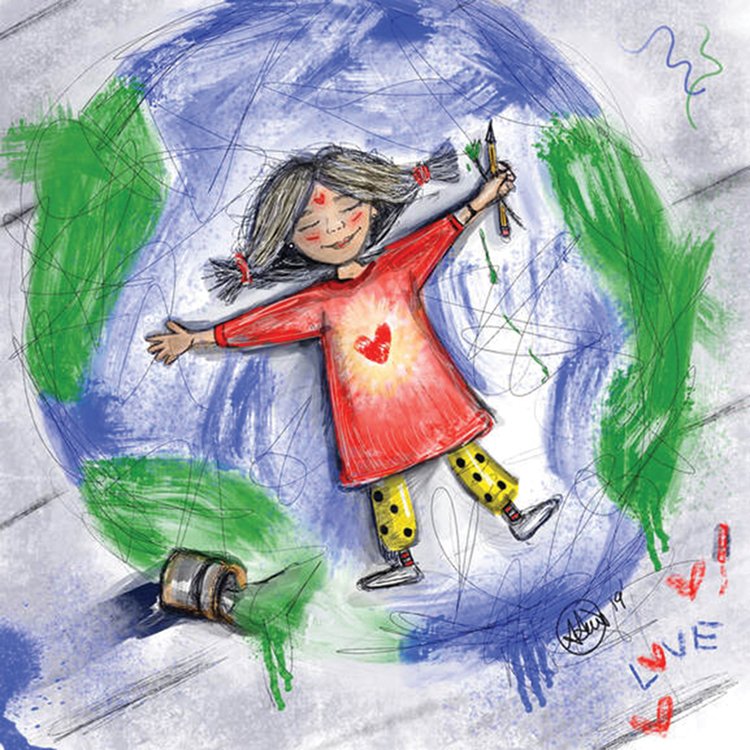
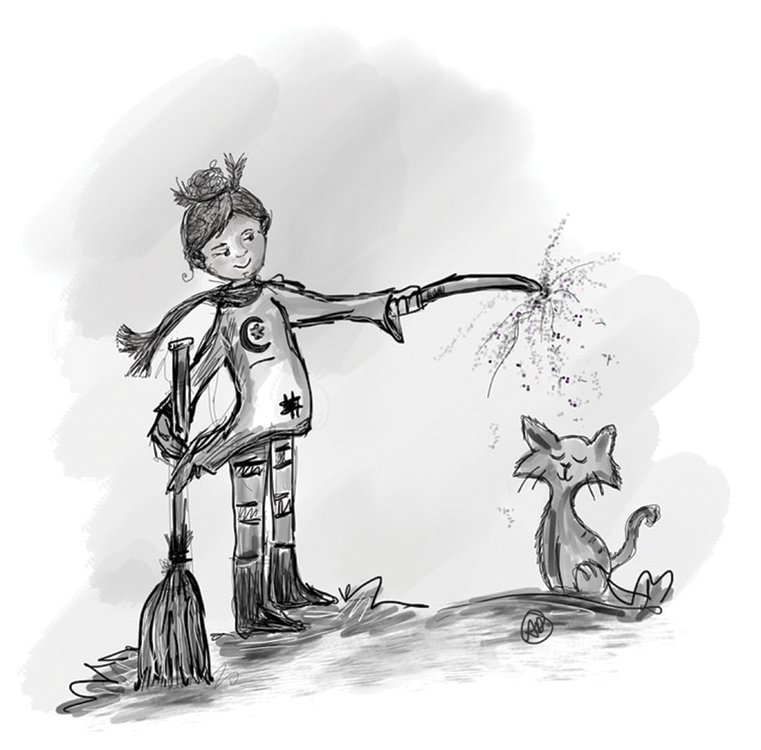
I’ve Changed My Mind
Poem: Two Horizontal Lines, by Haley McShane
By Haley McShane
Sparkling makeup and a slim waist
Kisses him at the Mercedes door.
She tries to talk. AHEM!
His wrathful baritone severs her hushed words.
The tender midwife places a cool cloth on her forehead-
As he drinks Jameson at the nearby rundown bar.
Tired like a migrating robin as
It reaches the translucent waters of the South.
The pressure to be perfect
Dissolves the little resolve that remains.
“Every great dream begins with a dreamer.”
Harriet Tubman’s words dwell in her determined heart.
He wakes up to find
A freshly-written note signed
“I’ve changed my mind.”
Haley McShane is a writer living in Massachusetts. She writes poetry, short stories, and freelance articles. Haley writes for Kingston Living magazine, a local periodical about the town of Kingston, MA. She covers local businesses, news, and events in the community. Haley's work has also appeared in The Boston Globe, Best4Bunny magazine, and online publications. Between 2012-2014, she wrote for her college newspaper The Mainsheet at Cape Cod Community College. Haley is a dynamic writer, weaving expository and creative styles in her work.
Two Horizontal Lines
Poem: Two Horizontal Lines, by Haley McShane
By Haley McShane
Two horizontal lines
Numbers on each side.
Woman and man
Of little money
and much-
Equal.
Souls from blistering Georgia heat
Unknown jungles of the Amazon
Lively European metropolis-
Balance.
Unkempt rags lugged through polluted water,
Greedy diamond pendants pepper palaces-
Levelled.
The world will wallow until
the drawbridge lowers at dusk.
Haley McShane is a writer living in Massachusetts. She writes poetry, short stories, and freelance articles. Haley writes for Kingston Living magazine, a local periodical about the town of Kingston, MA. She covers local businesses, news, and events in the community. Haley's work has also appeared in The Boston Globe, Best4Bunny magazine, and online publications. Between 2012-2014, she wrote for her college newspaper The Mainsheet at Cape Cod Community College. Haley is a dynamic writer, weaving expository and creative styles in her work.
The Short Story of Success
Angela Yeh, author of YA fantasy novel “A Phoenix Rises” writes a short story for Living Crue Magazine
By Angela Yeh
She wandered the aisles listlessly. She picked up a can of beans and set it down. She didn’t have anyone to cook for now. She let her memories draw her down to happier days. She sighed as she picked up a jug of orange juice. The small one this time. No need for the gallon jug. Not anymore.
When she reached the cashier, the kid barely glanced at her. She studied her stained flowered dress, and caught herself frowning, a pale reflection in the plastic divider. Dividing them and her. She slipped her hand underneath to take her change back.
“Have a blessed day,” he said, and she caught his eye this time. He leaned back, visibly shaken by whatever he perceived in the depths of her pupils. She smiled thinly and shuffled out of the way of a busy mother of three, monkeys leaping around her like crazy suns orbiting an exhausted moon.
“Enjoy these moments,” she announced to the mom because she was feeling mean.
The mother stared at her blankly but nodded, trying to be polite.
She reached her car, a beat-up gray Honda Civic with expired plates. She didn’t bother to buckle as she careened around the parking lot, being careful to avoid a stray dog limping by. She had the sudden destructive urge to run over the dog and put it out of its misery. She passed by, leaving the mutt unharmed, alarmed by her own thoughts.
When she got home, she threw her keys across the kitchen table and put the orange juice in the fridge.
The air conditioning unit buzzed and clanked, working as hard as it could in the hundred-degree heat. Still, the smell of rotting meat cloyed around the corners. The neighbors would call the police soon. That was okay. She was almost done.
“Hello, darling,” she said when she stepped airily into the living room. George sat where she shot him, one palm still curled around his beer, stiff with rigor mortis. His brain was sprayed against the back wall, although some had dripped to the brown carpet and congealed there. Flies were starting to find cracks and holes in the house and congregate at his shredded neck. She noticed the stubble on his chin. He would hate that.
“No need to shave anymore, George,” she said helpfully.
“You’d be proud of me. I only bought exactly what I needed. No silly spending on organic bread or expensive fruit. No, I got the orange juice and that was it,” she smiled, waiting for his approval. It never came. It didn’t now.
Sirens rose in the distance, and she wondered if they were coming for her. She stepped to the living room window and flicked up the beige curtains. No. They drove by, on their way to someone else’s house.
She turned back to George. “What? It’s too late for you anyway. I’m going to make some breakfast for supper. What do you think of that, George? And I’m going to watch TV. And I’m going to eat it in here. WITH the ketchup!” She grinned, caught a glimpse of herself in the mirror hanging beside the window, and froze.
“Well, hello there! Who are you?” Out of the corner of her eye, she caught a glimpse of something awful, horrible, too nightmarish to process.
She turned, sure what she was seeing must be wrong. A trick of the light. Her right eye twitched.
George stood up, fully intact, burped, and lumbered to the kitchen.
Her shoulders tensed as the fridge door was jerked open, then slammed shut.
“Damn it, Charlene, you got the wrong size OJ again. And you forgot the Gin. Damn it, woman!” He thundered back into the living room, “DO I have to do EVERYTHING my own goddam self!?” His rage, instant, brilliantly hot, blasted over her like a supernova. “You’re fucking useless. A goddamn burden. Good for nothing.”
She started to cry, falling to her knees, despair rushing over her, her soul sucking out through her toes.
“Oh, just cry again; that’s your favorite thing to do. Make me look like the bad guy. Manipulative bitch.”
Her spirit puddled out and squashed under his anger. His voice seemed far away now. When she looked up, he’d gone, slamming the front door so loud the screen door banged and snapped open and shut again. The Honda started up and roared out of the driveway.
She lay her hot cheek on the brown carpet; the individual threads could have been worms. Laughter bubbled up inside her. Was she dead already? She closed her eyes. Was she in the ground? A memory flashed behind her eyelids. Her, as a young girl, swinging through the maple trees on her grandmother’s farm. No. She was not dead yet.
She could swing one last time. Or she could leave. Start over. Death of a different kind. She looked around their small home. It wasn’t much, but it was all she had.
She was still wandering the rooms, as if memorizing them, taking one last look around when she heard the tires screech, someone laying on a horn, and a terrific crash, then awful silence. She waited, daring to hope. When she didn’t hear his heavy steps on the stairs she floated to the window. What she could see of the Honda was the trunk, which popped open on impact, the front end disappearing inside the bowels of a garbage truck. The driver staggered out of the high seat, lurching back to see what had hit him.
She found herself beside the car, peering inside the mangled mess of broken metal and snapped bone. The bottle of Gin was still rolling around in the back seat. The silence held. Hope grew. Relief bloomed, flowered, took root, and grew so fast she felt taller physically, and laughter escaped between her grinding teeth.
“I’m so sorry, ma’am. I don’t know what happened. Is he—oh god. Dios Mio. Oh god, oh god, o—” The man turned green, spun away from her, and threw up on the sidewalk.
She needed to be sure. Sirens wailed in the distance, rapidly growing closer. Someone had finally called 911.
She walked quickly to the driver’s side. His face was gone, melded into the back of a rusted piece of grinding machinery. A rotting banana was flung over his shoulder and scraps and curls of discarded paper leaked into the backseat. She marveled at herself. There was no pity. No grief.
A strange feeling washed over her. It was light like a fire, burning and scorching as it filled her chest. She looked away from the wreckage, holding her stomach and doubling over with laughter, with relief.
She was led to the back of the ambulance. “Hysterical,” one said, shaking his head. “Must have been awful. She probably saw the whole thing. Poor girl.”
Kindly, he swabbed her arm and injected a low dose of droperidol.
“It’s alright, ma’am, he didn’t suffer at all. Happened instantly.”
As the drug began to calm her jagged nerves, she heard their voices in the air, floating like they were in dialogue bubbles. “— see what caused — someone said — driver didn’t see him coming — a dog.”
She sat up slowly, with help, as the second paramedic climbed into the back with a brown bundle of fur. In a flash of recognition, she realized this was the mutt from the supermarket.
“Is this your dog, ma’am?”
She looked into its liquid brown eyes, the whites showing from fear, and she nodded, folding the frightened dog onto her lap. “Yes. His name is George.”
Angela Yeh is an East Coast Canadian native who grew up a stone’s throw from Stephen King’s Maine. She now lives in Texas and sees Chuck Norris on the always. Angela is a short, tall-story-teller who loves to garden, write about magic, and eat cake. Her first published novel, “A Phoenix Rises,” was a finalist in the Dante Rossetti Book Awards for Young Adult Fiction. You can follow her antics on Twitter @thatplukcygirl and Instagram @thatpluckygirl and at her website www.thepluckycanadian.com.


